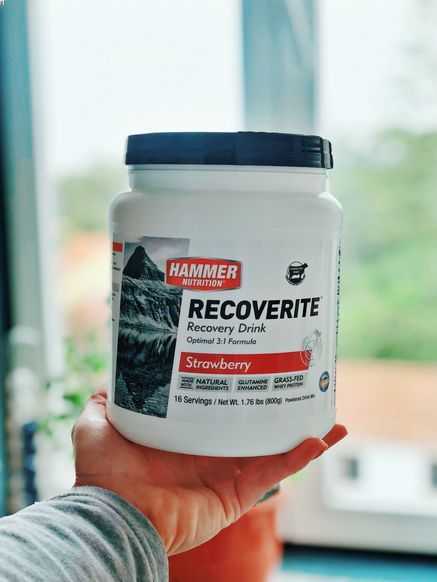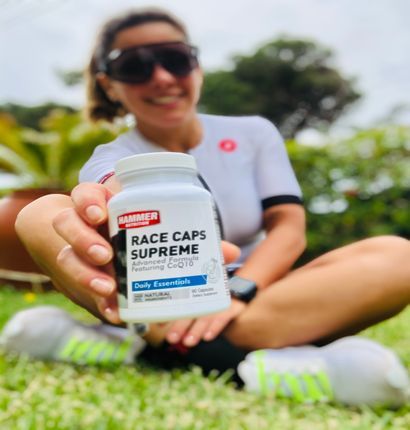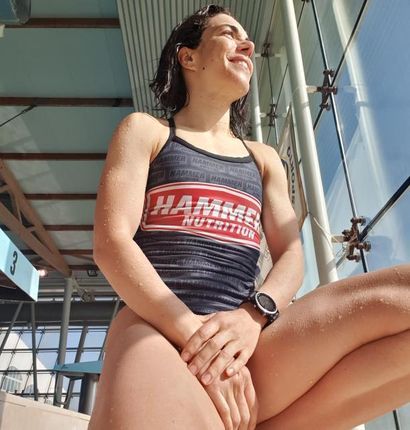RECOVERY
THE RACER'S EDGE: RECOVERY
Within 60 minutes after your workout or race, consume:
-
30-60 grams of high-glycemic complex carbohydrates
-
10-20 grams of protein, preferably whey isolate
-
complementary amino acids and micronutrients

SECRET #5: RECOVERY MATTERS
For better performance tomorrow, recover right today!
Training alone will not yield the results you hope to achieve as an athlete. Whether your goal is a new PR or simply becoming fit and feeling strong, recovery must be a key part of your overall regimen if you want to achieve results. Taking a few extra minutes to properly refuel after you exercise—when your body is in a state of prime receptivity—will help restore your body’s premium fuel (glycogen), rebuild muscle, and strengthen your immune system. To maximize your training efforts and improve race-day performance, learn these keys to recovery success.

To maximize your training efforts and improve race-day performance, learn these keys to recovery success.

#1 - REHYDRATION
Water has no nutrient value but it’s essential for performance and recovery. As a rule of thumb, you want to finish a workout with no more than about 2% body weight loss. Weight loss of more than 2% signals performance decline and dehydration. Within the first several hours after your workout, aim to drink about 1 pint of fluids for each pound (roughly 475 ml/kg ) of weight lost during a workout or race. That’s fairly easy, and you can get much of that through your nutritional replenishment, which we’ll cover next.

#2 - CARBOHYDRATES
Your body benefits from two key nutrients during recovery: carbohydrates and protein. Consuming carbohydrates after exercise will help your body replenish its premium fuel, glycogen. Carbohydrates also give muscles energy to absorb amino acids from the bloodstream, helping to initiate protein synthesis.
Keep this in mind:
Several studies have shown that pre-exercise muscle glycogen level is the most important energy determinant for exercise performance. Athletes who have more of this readily available fuel in their bodies have a definite advantage. The good news is that you can substantially increase your glycogen storage capacity through the process of training and replenishing. During the recovery phase, your body converts carbohydrates from food into glycogen and stores them in muscle cells. This also drives the muscle repair and rebuilding process.
To maximize glycogen synthesis and storage during recovery:
-
Consume carbohydrates within 60 minutes after exercise. Researchers at the University of Texas at Austin demonstrated that glycogen synthesis was highest when subjects were given carbohydrates immediately after exercise.
-
Choose high-glycemic complex carbohydrates. A high-glycemic complex carbohydrate (like the maltodextrin in Recoverite) is ideal because it spikes blood levels of insulin—and that’s desirable after exercise. Insulin replenishes muscle glycogen, stimulates protein synthesis (needed to repair and rebuild muscles), and suppresses protein breakdown. And unlike the simple sugars used in most recovery products, the complex carbohydrate maltodextrin is easily digested and rapidly assimilated. It efficiently restores muscle glycogen without causing stomach distress.
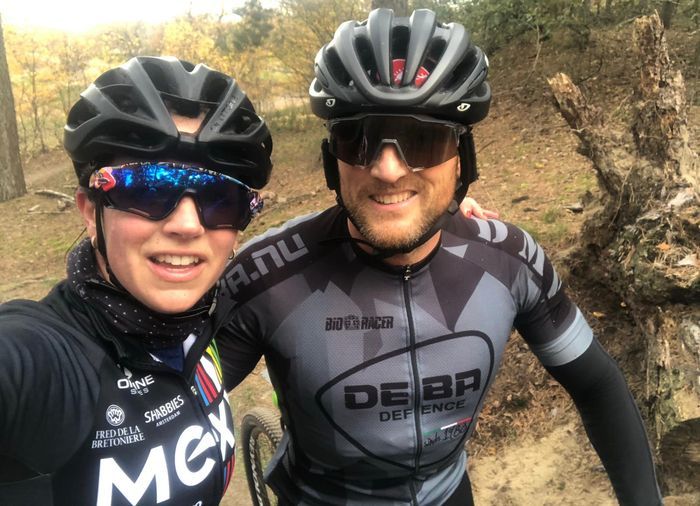
#3 - PROTEINS
Protein in your post-workout fuel provides raw materials to rebuild stressed muscles, enhances glycogen storage, and supports the immune system. For recovery between workouts, we recommend whey protein isolate as the best protein source. Here’s why:
-
Whey works fast. Whey has the highest Biological Value (BV) of all proteins. BV is considered an accurate indicator of how well and how quickly your body uses a protein that you consume. Whey protein isolate (the purest form of whey protein) has an outstanding BV of 154; whey protein concentrate has a rating of 104. Hammer Whey and Recoverite both use whey protein isolate, not whey concentrate. Whey protein isolate is purer: 90-97+% protein and virtually free of fat and lactose. Whey concentrate contains only 70-80% protein or less.
-
Whey is better for muscle repair. Compared to soy, whey protein isolate is a much better source of branched-chain amino acids (BCAAs), including three crucial to the muscle tissue repair process: leucine, isoleucine, and valine.
-
Whey supports the immune system. Whey protein contains excellent levels of the amino acids associated with glutathione. This critically important antioxidant often becomes depleted due to aging, stress, and environmental toxins. Ward Dean, MD, a leading nutritional scientist, calls glutathione a “master antioxidant” that “has major effects on health at the molecular, cellular, and organ levels.”
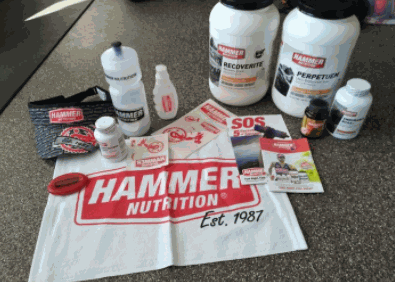
4# - MICRO ESSENTIALS
Research has revealed that small amounts of several other substances can give a big boost to the recovery, too. Recoverite contains all three of the following recovery-boosting essentials, as well as a full-spectrum profile of electrolytes and antioxidants.
-
L-glutamine preserves and rebuilds lean tissue, supports the immune system, boosts glutathione levels, and aids gastrointestinal health.
-
L-carnosine offers antioxidant and antiglycation benefits. Glycation is a process that causes irreversible damage to the body’s proteins; some scientists cite it as an underlying cause of age-related problems.
-
Chromium polynicotinate boosts glycogen synthesis. Studies suggest that athletes who consume it (along with ample carbohydrates) within two hours of exercise can experience a 300% increase in glycogen synthesis.
Hammer Nutrition’s Recoverite also contains the antioxidants cysteine, methionine, glutamic acid, glutamine, and carnosine. As an athlete, you consume huge amounts of oxygen and metabolize far greater amounts of calories than a sedentary person does, so your need for antioxidants is far greater. Prolonged exercise produces many different types of free radicals and each antioxidant targets different free radicals. That’s why it’s important to supplement with a variety of antioxidants, such as those in Recoverite,
Taking other antioxidant supplements—like Hammer Nutrition’s AO Booster, Super Antioxidant, Race Caps Supreme, and Mito Caps - after your workout, and eating antioxidant-rich foods (such as almonds, blueberries, broccoli, and carrots) will also boost your immune system.
Bottom line
If you give as much attention to your recovery as you do to your training, you’ll have a distinct edge over other athletes. Replenish your body within 30-60 minutes of exercise with adequate complex carbohydrates, whey protein isolate, and antioxidants, and experience the difference it will make in your performance and overall health
THE FAST LANE
For maximum glycogen replenishment, consume 30-60 grams of high-quality, complex carbohydrates as soon as possible after exercise.
Compared to simple sugars, complex carbohydrates allow more calories to be absorbed for conversion to glycogen. Whey protein isolate (not concentrate) is virtually free of lactose and fat, and ideal for recovery.
For endurance athletes who want lean muscle mass, a 3:1 carbohydrate to protein ratio (as provided in Recoverite) is best during recovery.
It’s important to replenish vitamins and minerals depleted during exercise with a full-spectrum supplement, such as Premium Insurance Caps. Free radicals produced during exercise can cause significant damage. Neutralize them with antioxidants.
